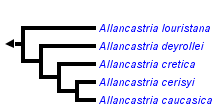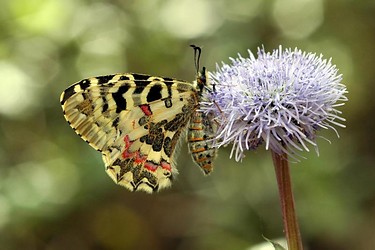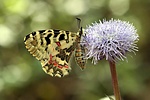Allancastria
Vazrick Nazari


This tree diagram shows the relationships between several groups of organisms.
The root of the current tree connects the organisms featured in this tree to their containing group and the rest of the Tree of Life. The basal branching point in the tree represents the ancestor of the other groups in the tree. This ancestor diversified over time into several descendent subgroups, which are represented as internal nodes and terminal taxa to the right.

You can click on the root to travel down the Tree of Life all the way to the root of all Life, and you can click on the names of descendent subgroups to travel up the Tree of Life all the way to individual species.
For more information on ToL tree formatting, please see Interpreting the Tree or Classification. To learn more about phylogenetic trees, please visit our Phylogenetic Biology pages.
close boxIntroduction
The genus Allancastria today consists of five species: Allancastria cerisy (Godart, 1824); A. deyrollei Oberthür, 1869; A. cretica (Rebel, 1904); A. caucasica (Lederer, 1864); and A. louristana (Le Cerf, 1908) (Häuser et al., 2005). They have a western Palaearctic distribution and their larvae feed on various species of Aristolochia (Aristolochiaceae).
Nomenclature
The name Allancastria first appeared in print in 1932 in a paper by Bryk (Hemming, 1967). It has frequently been considered a subgenus of Zerynthia Ochsenheimer, 1816 (e.g. Hesselbarth et al., 1995), and the species belonging to it have previously been classified under Zerynthia, Thais Fabricius, 1807, or Parnalius Rafinesque, 1815 (see Ackery, 1975; Hesselbarth et al., 1995). According to Hemming (1967), the name Thais Fabricius, 1807 is invalid, as it is a junior homonym of Thais Röding, 1798. Ackery (1975: 90, 91) treated Allancastria as a junior subjective synonym of Parnalius Rafinesque, 1815, under which he included P. cerisy, P. rumina and P. polyxena, and indicated that if Allancastria has to be recognized as a genus “there is equal justification for raising the status of the species groups of Parnassius to genera”. The priority of the name Parnalius Rafinesque, 1815 was later suppressed by the ICZN in favor of Zerynthia Ochsenheimer, 1816 (ICZN opinion 1134, 1979).
Hemming (1967: 37) believed that the name Allancastria was invalid, since “Bryk (1932) provided no generic diagnosis and designated no type species, both essential requirements for a generic name published after the close of 1930” (Article 13, ICZN). However, according to Cowan (1970: 41), Bryk actually designated Thais cerisy Godart, [1824] as the type species in 1934; and therefore the name Allancastria should be considered valid and available. The genus Allancastria, including the only species that was then known, Allancastria cerisy, was first separated from Zerynthia by Bryk in 1934. The monotypy of Allancastria held for a long time, and many local forms and subspecies were described for A. cerisy, some of which were later elevated to species rank.
References
Ackery, P.R., 1975. A guide to the genera and species of Parnassiinae (Lepidoptera: Papilionidae). Bull. Br. Mus. Nat. Hist. Ent. 31: 71-105, plates 1-15.
Bryk, F., 1932. Kritische revision der gattung Parnassius unter benutzung des materials der kollektion Eisner, Dahlem (ortsetzung). Parnassiiana 2: 104.
Bryk, F., 1934. Baroniidae, Teinopalpidae, Parnassiidae, Part.I. Das Tierreich, Deutschen Zoologische Gesellschaft im Auftrag der Preussischen Akademie der Wissensch. Berlin und Lepizig, 64: I-XXIII, 1-131.
Cowan, C.F., 1970. Annotations Rhopalocerologicae. 70 p., Berkhamsted.
Häuser, C.L., de Jong, R., Lamas, G., Robbins, R.K., Smith, C., Vane-Wright, R.I., 2005. Papilionidae – revised GloBIS/GART species checklist (2nd draft). Accessed December 2005.
Hemming, A.F., 1967. The generic names of the butterflies and their type-species (Lepidoptera: Rhopalocera). Bull. Br. Mus. Nat. Hist. Ent. Suppl. 9: 509 pp.
Hesselbarth, G., van Oorschot, H., Wagener, S., 1995. Die Tagfalter der Türkei. 1. 754 pp. Bocholt, Selbstverlag Sigbert Wagener.
ICZN, 1979. Opinion 1134. Bulletin of Zoological Nomenclature 36: 102.
Nazari, V., Zakharov, E.V., Sperling, F.A.H., 2007. Phylogeny, historical biogeography, and taxonomic ranking of Parnassiinae (Lepidoptera, Papilionidae) based on morphology and seven genes. Molecular Phylogenetics and Evolution, 42: 131-156.
About This Page
Vazrick Nazari

Canadian National Collection of Insects, Arachnids and Nematodes, Ottawa, Canada
Correspondence regarding this page should be directed to Vazrick Nazari at
Page copyright © 2006 Vazrick Nazari
 Page: Tree of Life
Allancastria .
Authored by
Vazrick Nazari.
The TEXT of this page is licensed under the
Creative Commons Attribution License - Version 3.0. Note that images and other media
featured on this page are each governed by their own license, and they may or may not be available
for reuse. Click on an image or a media link to access the media data window, which provides the
relevant licensing information. For the general terms and conditions of ToL material reuse and
redistribution, please see the Tree of Life Copyright
Policies.
Page: Tree of Life
Allancastria .
Authored by
Vazrick Nazari.
The TEXT of this page is licensed under the
Creative Commons Attribution License - Version 3.0. Note that images and other media
featured on this page are each governed by their own license, and they may or may not be available
for reuse. Click on an image or a media link to access the media data window, which provides the
relevant licensing information. For the general terms and conditions of ToL material reuse and
redistribution, please see the Tree of Life Copyright
Policies.
- First online 07 July 2006
- Content changed 07 July 2006
Citing this page:
Nazari, Vazrick. 2006. Allancastria . Version 07 July 2006 (under construction). http://tolweb.org/Allancastria/65401/2006.07.07 in The Tree of Life Web Project, http://tolweb.org/








 Go to quick links
Go to quick search
Go to navigation for this section of the ToL site
Go to detailed links for the ToL site
Go to quick links
Go to quick search
Go to navigation for this section of the ToL site
Go to detailed links for the ToL site